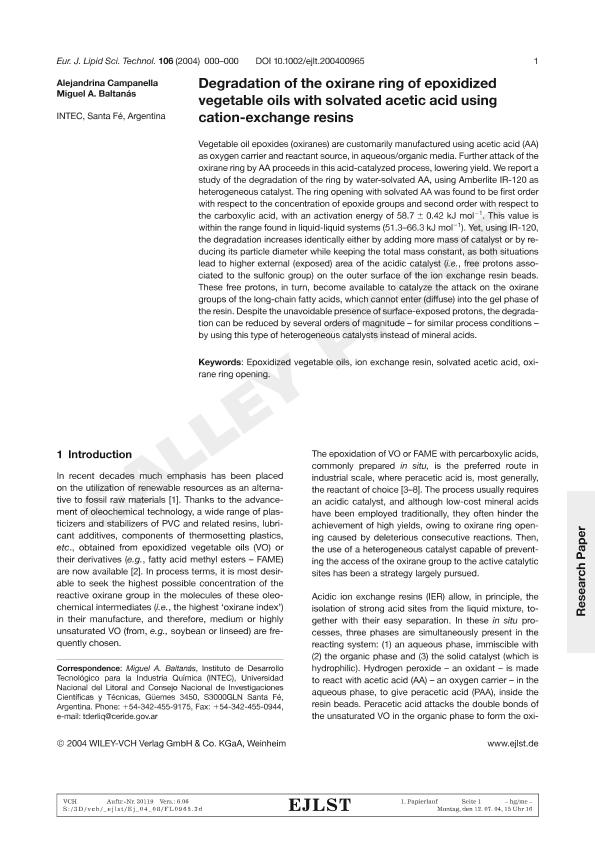Artículo
Degradation of the Oxirane Ring of Epoxidized Vegetable Oils with Solvated Acetic Acid Using Cation-exchange Resins
Fecha de publicación:
05/2004
Editorial:
Wiley VCH Verlag
Revista:
European Journal of Lipid Science and Technology
ISSN:
1438-7697
Idioma:
Inglés
Tipo de recurso:
Artículo publicado
Clasificación temática:
Resumen
Vegetable oil epoxides (oxiranes) are customarily manufactured using acetic acid (AA) as oxygen carrier and reactant source, in aqueous/organic media. Further attack of the oxirane ring by AA proceeds in this acid-catalyzed process, lowering yield. We report a study of the degradation of the ring by water-solvated AA, using Amberlite IR-120 as heterogeneous catalyst. The ring opening with solvated AA was found to be first order with respect to the concentration of epoxide groups and second order with respect to the carboxylic acid, with an activation energy of 58.7 ± 0.42 kJ mol-1. This value is within the range found in liquid-liquid systems (51.3–66.3 kJ mol-1). Yet, using IR-120, the degradation increases identically either by adding more mass of catalyst or by reducing its particle diameter while keeping the total mass constant, as both situations lead to higher external (exposed) area of the acidic catalyst (i.e., free protons associated to the sulfonic group) on the outer surface of the ion exchange resin beads. These free protons, in turn, become available to catalyze the attack on the oxirane groups of the long-chain fatty acids, which cannot enter (diffuse) into the gel phase of the resin. Despite the unavoidable presence of surface-exposed protons, the degradation can be reduced by several orders of magnitude – for similar process conditions – by using this type of heterogeneous catalysts instead of mineral acids.
Archivos asociados
Licencia
Identificadores
Colecciones
Articulos(INTEC)
Articulos de INST.DE DES.TECNOL.PARA LA IND.QUIMICA (I)
Articulos de INST.DE DES.TECNOL.PARA LA IND.QUIMICA (I)
Citación
Campanella, Alejandrina; Baltanas, Miguel Angel; Degradation of the Oxirane Ring of Epoxidized Vegetable Oils with Solvated Acetic Acid Using Cation-exchange Resins; Wiley VCH Verlag; European Journal of Lipid Science and Technology; 106; 8; 5-2004; 524-530
Compartir
Altmétricas




